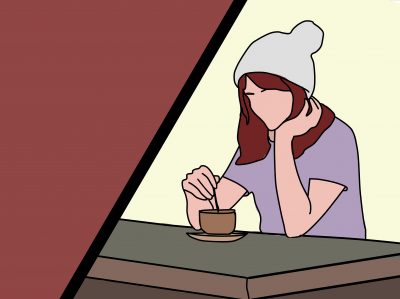I’m at Starbucks, sitting pretty comfortably with my grande water and a $2 bagel. For the past three days I’ve been trying to finish an article about my crippling imposter syndrome as I head toward an uncertain future, and the Google Docs tab has just been mocking me in its unfinished glory. I dragged myself to a coffee shop because I thought the change of scenery would force me to finish. Instead, I’m writing this.

I don’t know what it is about men, but I always assume the worst of them. One guy has been sitting behind me as I type, and I’ve felt his eyes on my back this whole time. It’s unnerving.
This situation reminds me of Cheryl Strayed’s memoir, “The Love of my Life.”
Strayed opens with an anecdote about the first man she cheated on her husband with. She was 22, a week into mourning her mother and burdened with grief. A man at a cafe approached her, took her outside and kissed her aggressively.
This interaction sparked two years of “sexual escapades” occurring behind her husband’s back. Sex was her bandaid over grief. She hated herself for it, and when she finally confessed to her husband and friends, they hated her too.
After all, she had all the makings of a bad person: good people don’t cheat on their husbands. Strayed cheated on her husband, thus Strayed is not a good person.
Although she doesn’t excuse her actions, she argues this mindset is a product of an American cultural tendency to view things as either black or white.

“We want it to be true that if we cheat on our spouse, it means we no longer want to be married to him or her,” Strayed wrote. “We want it to be true that if someone we love dies, we simply have to pass through a series of phases, like an emotional obstacle course from which we will emerge happy and content, unharmed and unchanged.”
American individualism runs deep — pull yourself up by the bootstraps and move on. This goes beyond economic mobility. We should get over poverty, stress and the death of our mothers quickly. We’re expected to mourn briefly and quietly before we resume business as usual. We’re expected to suck it up and finish our articles about crippling imposter syndrome and uncertain futures.
This mindset fails us. When we don’t meet the expectations we’ve internalized, we’re left feeling unworthy. Why am I so morally inferior to my peers? Why do they not cheat on their husbands? How do they move on from the deaths of their mothers? Why can’t I?
For me, it manifests itself in this cafe. Maybe if I were a stronger person with a louder voice I would do something about the man who watches me as I write.
I’m uncomfortable. I don’t feel safe. Yet, it is so hard for me to be proactive about it. I’m supposed to do something about this. I’m supposed to finish my article. Any other person would be able to. Why can’t I?
Strayed’s raw portrayal of grief also serves as commentary on American individualism. She challenges cultural norms we may not even recognize, and does so authentically. It’s okay to not make the right choices. No one is always correct. The world isn’t black and white.
We should support ourselves and each other as we feel and act at our own pace.























































































































